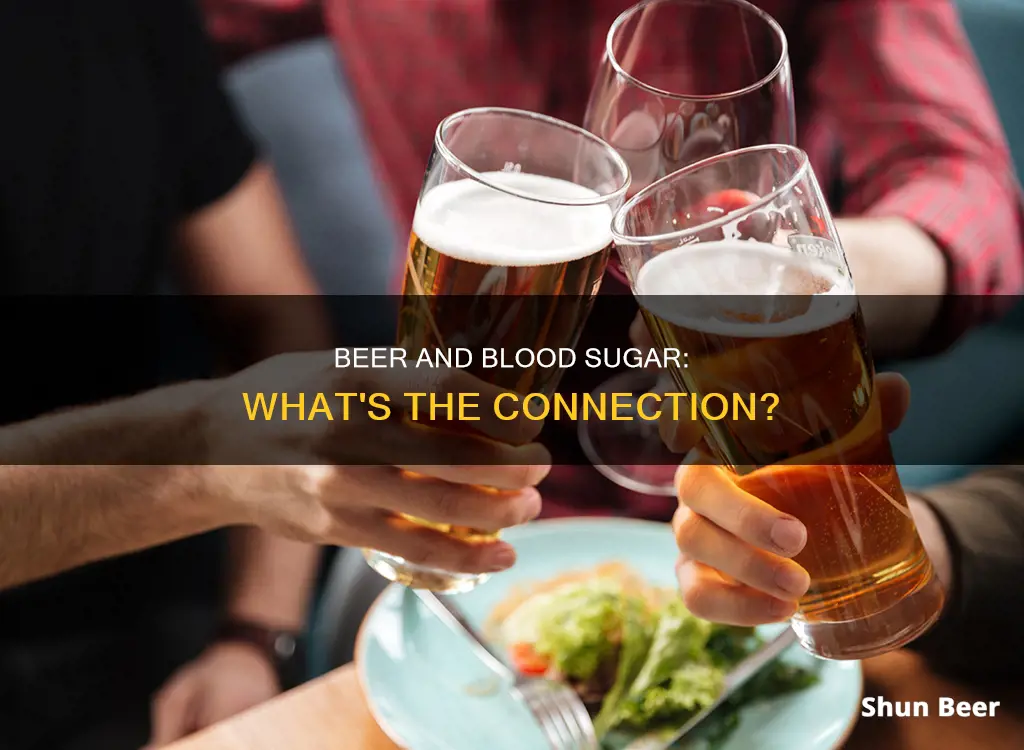
Beer and other alcoholic drinks can have a significant impact on blood sugar levels, especially for people with diabetes. Alcohol can affect the liver's ability to regulate blood sugar, causing it to drop too low, a condition known as hypoglycemia. This is because the liver prioritises breaking down alcohol over releasing glucose, leading to unstable blood sugar levels. Additionally, alcoholic drinks often contain carbohydrates and calories, which can cause weight gain and further disrupt blood sugar control. For people with diabetes, drinking alcohol can interfere with their medications and increase the risk of diabetes-related complications. Therefore, it is recommended that alcohol be consumed in moderation and only when blood sugar levels are well-managed. Consulting a doctor is essential to understanding the risks and ensuring safe drinking habits.
| Characteristics | Values |
|---|---|
| Effect on blood sugar levels | Beer can increase blood sugar levels, especially in people with diabetes. |
| Effect on appetite | Beer stimulates the appetite, which can lead to overeating and weight gain. |
| Effect on medication | Beer may reduce the effectiveness of diabetes medications. |
| Recommended intake | Men should not consume more than two drinks per day, and women should not exceed one drink per day. |
| Calories | Beer contains calories, which can contribute to weight gain. |
| Carbohydrates | Beer contains carbohydrates, which can raise blood sugar levels. |
| Alcohol content | The alcohol content of beer varies, with craft beers typically having higher alcohol content than bottled beers. |
| Type of beer | Low-carb beers may be a better option for people with diabetes as they have fewer carbohydrates and calories. |
What You'll Learn
- Beer contains carbohydrates, which can increase blood sugar levels
- Alcohol can affect the hormones that regulate blood sugar
- Drinking beer can lead to weight gain, which can make diabetes harder to manage
- Alcohol may reduce the effectiveness of diabetes medications
- Drinking beer without eating food increases the risk of hypoglycaemia

Beer contains carbohydrates, which can increase blood sugar levels
Beer contains carbohydrates, which are absorbed into the bloodstream relatively quickly, leading to increased glucose levels. This is why elevated blood sugar is often seen shortly after consuming alcohol. The liver stabilises glucose levels by storing carbohydrates and releasing them into the bloodstream between meals and overnight. However, when you drink alcohol, your liver has to work to break it down, and so it stops releasing glucose. This means your blood sugar levels can drop quickly, and you are at risk of hypoglycaemia.
The risk of hypoglycaemia is greater when drinking on an empty stomach, as there are no carbohydrates to help maintain blood sugar levels. Alcohol stimulates the appetite, so drinking during a meal may lead to overeating and could contribute to weight gain. Alcoholic drinks are often high in calories, and the more you drink, the higher your risk of weight gain.
Beer and sweetened mixed drinks are high in carbohydrates, which can raise blood sugar levels. The number of carbohydrates in different beers varies, and this will impact your blood sugar levels. For example, craft beers usually have more calories and carbohydrates than bottled beers.
If you have diabetes, it is recommended that you drink in moderation and only when your diabetes and blood sugar levels are well-managed. It is also important to monitor your blood sugar levels before, during, and after drinking.
Sugar Secrets: Priming Beer with Precise Sugar Grams
You may want to see also

Alcohol can affect the hormones that regulate blood sugar
Alcohol can indeed affect the hormones that regulate blood sugar. The body's blood sugar levels are controlled by insulin and glucagon, hormones secreted by the pancreas. Insulin lowers glucose levels, while glucagon raises them. Other hormones from the adrenal glands and the pituitary gland back up the function of glucagon to ensure the body's glucose level doesn't fall too low, which could cause fainting, passing out, or even brain damage.
When alcohol enters the body, it passes through the small intestine and into the bloodstream, where it can travel to the brain in as little as five minutes and disrupt the activities of chemical messengers, or hormones, that control multiple functions. Alcohol interferes with the body's production of insulin, a hormone that controls the amount of glucose in the blood. Because alcohol consumption increases the presence of glucose in the body, this causes blood sugar levels to spike, raising the risk of type 2 diabetes and hyperglycaemia in those with pre-existing diabetes.
Additionally, alcohol can cause temporary hypoglycaemia by augmenting insulin secretion. It also inhibits glucose production while the body is metabolising alcohol and can impair the hormonal response to hypoglycaemia with heavy consumption. Chronic heavy drinking can increase the body's glucose levels and lead to glucose intolerance in healthy people. It can also alter the effectiveness of medications for diabetes, cause both hypoglycaemic and hyperglycaemic episodes in alcoholics, increase the secretion of glucagon and other hormones that raise glucose levels, and reduce the body's responsiveness to insulin.
Beer and Diabetes: Is There Sugar in Beer?
You may want to see also

Drinking beer can lead to weight gain, which can make diabetes harder to manage
Beer and other alcoholic drinks can affect your body's ability to regulate blood sugar. When you drink alcohol, your liver has to work to remove it from your bloodstream instead of regulating blood sugar levels. This can cause your blood sugar levels to drop too low, a condition known as hypoglycemia. This is especially likely to happen when drinking on an empty stomach, as your liver won't be releasing glucose into your bloodstream between meals.
Drinking beer can also affect people with diabetes in other ways. Firstly, it can increase weight gain, as mentioned earlier. Alcoholic drinks are often high in calories, making it more difficult to lose excess weight. Beer and sweetened mixed drinks are also high in carbohydrates, which can cause a temporary rise in blood sugar levels. Additionally, drinking alcohol can make it harder to stick to a healthy diet and can reduce the effectiveness of diabetes medications.
It's important to note that drinking in moderation and only when your diabetes and blood sugar levels are well-managed can lower the risks associated with alcohol consumption. It's always a good idea to talk to your doctor to understand the guidelines based on your specific health concerns.
Beer and Sugar: The Sweet Truth About Beer
You may want to see also

Alcohol may reduce the effectiveness of diabetes medications
Alcohol can affect the effectiveness of diabetes medications, including insulin and oral hypoglycaemic medications. This is primarily because the liver, which is responsible for metabolising alcohol, also plays a crucial role in regulating blood sugar levels. When you consume alcohol, your liver prioritises breaking down alcohol instead of releasing glucose or turning proteins and fats into carbohydrates. This disruption in the liver's functions can lead to hypoglycaemia, or low blood sugar levels.
Additionally, alcohol can interfere with the action of certain diabetes medications. For example, it can reduce the effectiveness of insulin, leading to higher blood sugar levels. Alcohol can also interact with specific diabetes drugs, such as chlorpropamide, metformin, and troglitazone, leading to unpleasant side effects or worsening liver damage.
The impact of alcohol on diabetes medications is a concern, especially when combined with the medications commonly used to treat diabetes. This combination can result in low blood glucose levels, also known as hypoglycaemia. Therefore, it is essential for individuals with diabetes to consult their doctors before consuming alcohol to understand the potential risks and ensure their medication's effectiveness.
Furthermore, alcohol consumption can affect the body's ability to regulate blood sugar levels and interfere with the hormones needed to maintain healthy blood sugar levels. It can also stimulate appetite, leading to overeating and further increasing blood sugar. Alcoholic drinks are often high in calories, making weight loss more challenging.
To minimise the impact of alcohol on diabetes medications, it is recommended to drink in moderation and only when blood sugar levels are well-managed. Consulting a doctor can provide guidelines based on individual health concerns. Additionally, drinking with meals and including carbohydrates can help reduce the risk of hypoglycaemia.
Abita Beer: Sugar Content and Nutritional Facts
You may want to see also

Drinking beer without eating food increases the risk of hypoglycaemia
Drinking beer without eating food can increase the risk of hypoglycaemia, or low blood sugar. This is because the liver, which is responsible for stabilising blood sugar levels, struggles to perform its dual roles of detoxification and blood sugar maintenance simultaneously. When alcohol is present in the body, the liver will prioritise metabolising it over maintaining blood sugar levels, potentially leading to hypoglycaemia.
The risk of hypoglycaemia is particularly high for those who drink on an empty stomach, as this makes it extremely difficult for the liver to release glucose into the bloodstream. People who are diabetic are also at an increased risk of hypoglycaemia when consuming alcohol, as their liver may not be able to produce enough glycogen to prevent blood sugar levels from falling too low.
To reduce the risk of hypoglycaemia, it is important to eat food, especially carbohydrates, before drinking alcohol. It is also recommended to drink in moderation, with health practitioners advising that adult men should not consume more than two standard drinks per day, and women should not exceed one standard drink per day.
Additionally, it is important for people with diabetes to monitor their blood sugar levels closely before, during, and after drinking alcohol. If a sudden change in blood sugar levels is noticed, it is crucial to stop drinking and seek medical attention.
While alcohol consumption can increase the risk of hypoglycaemia, it is important to note that it can also have a beneficial effect on blood glucose management and insulin sensitivity for those who drink regularly. However, excessive drinking (more than three drinks daily) can lead to higher blood glucose levels. Therefore, it is crucial to drink in moderation and consult a doctor for personalised advice.
Sour Beers: High Sugar Content or Healthy Choice?
You may want to see also
Frequently asked questions
Beer can increase blood glucose levels because it contains carbohydrates, which are quickly absorbed into the bloodstream.
Drinking beer can cause low or high blood sugar, affect diabetes medications, and cause other possible problems. It is recommended that you consult your doctor before drinking beer if you have diabetes.
According to the American Diabetes Association, women should have no more than one drink per day, and men should have no more than two drinks per day.
Yes, drinks with fewer carbohydrates, such as light beers, dry wines, distilled spirits, and low-carb cocktails are better alternatives for people with diabetes.







